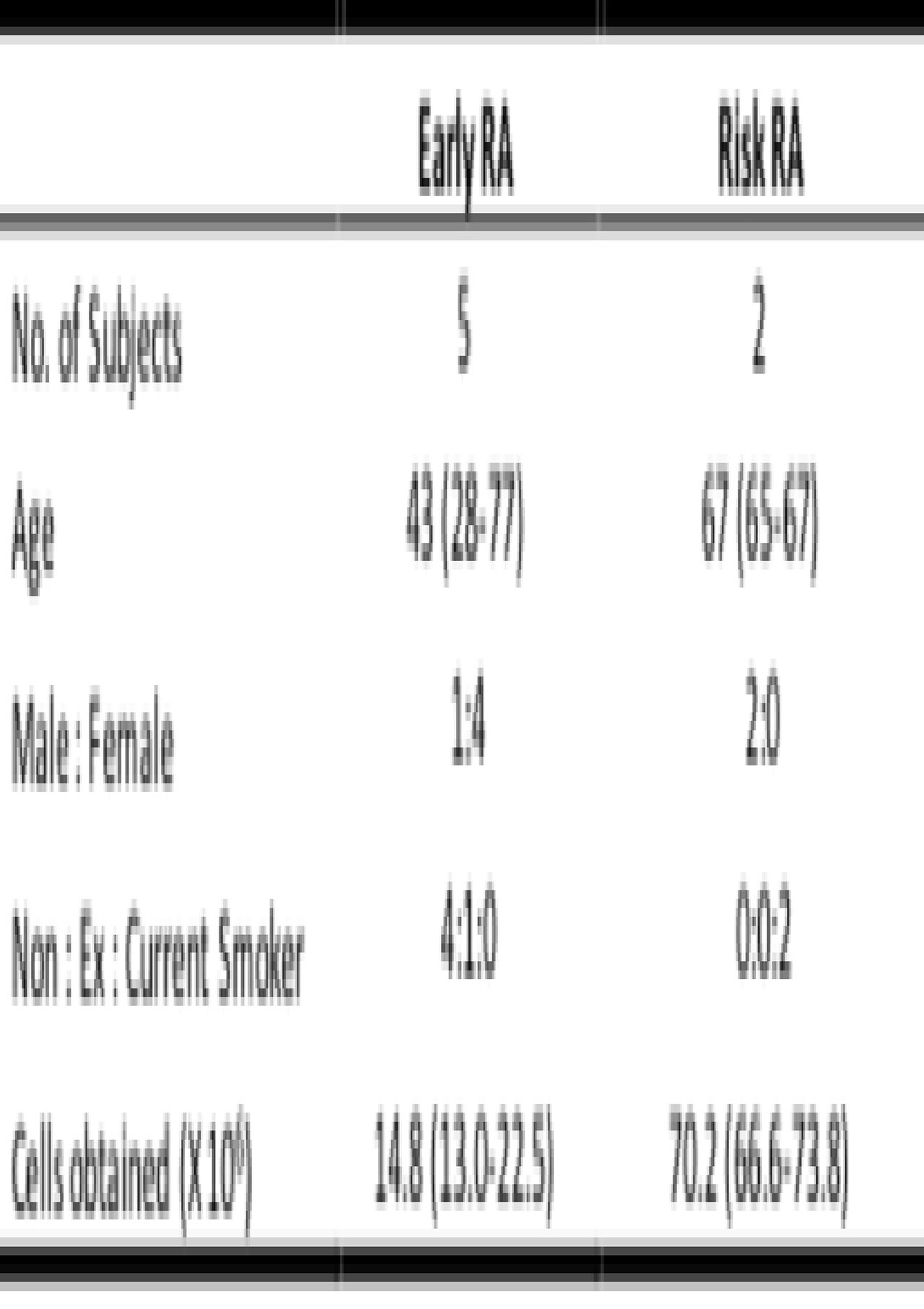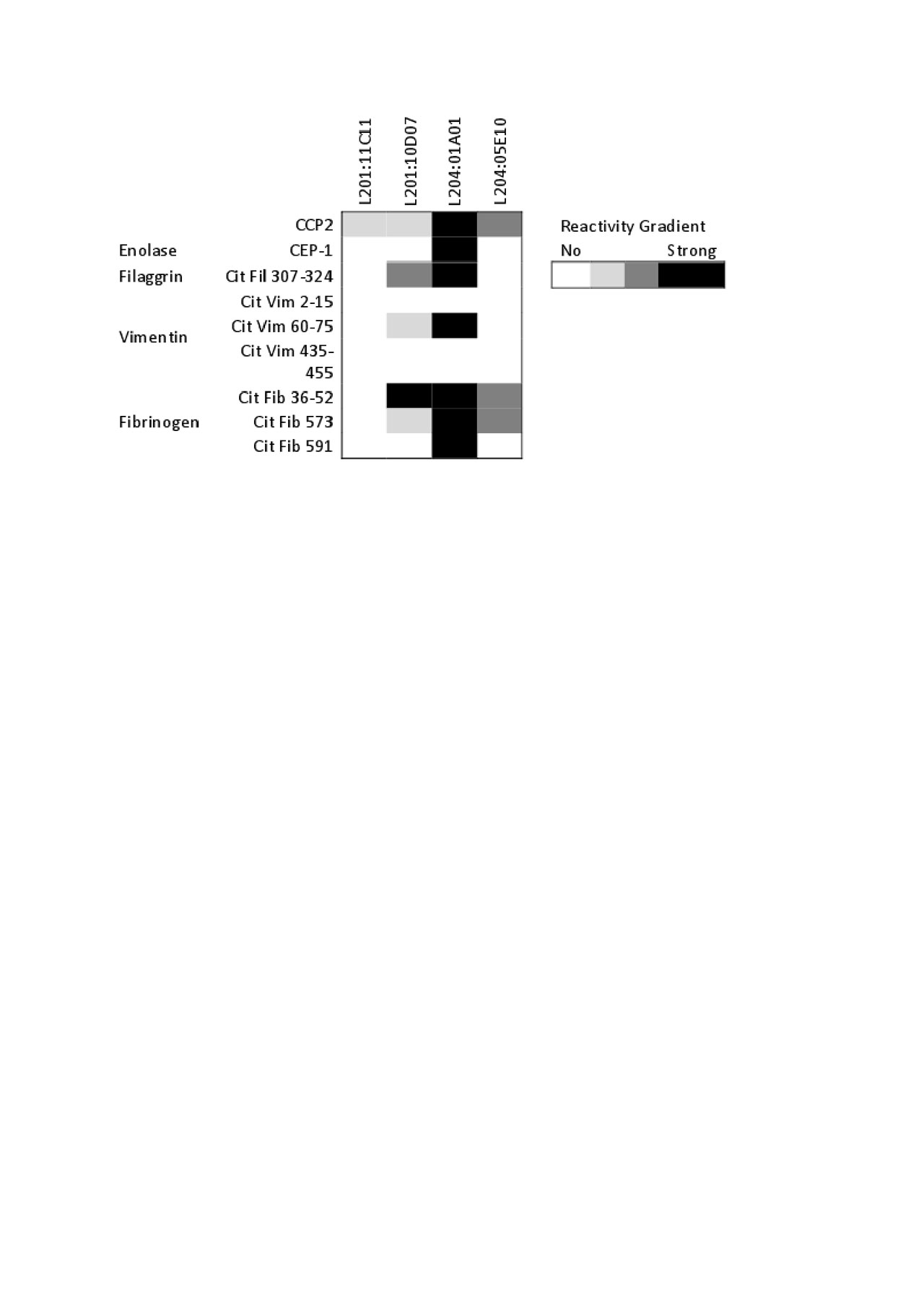Session Information
Session Type: ACR Abstract Session
Session Time: 9:00AM-10:30AM
Background/Purpose: Structural changes, increased tissue citrullination, signs of local inflammation and anti-citrullinated protein autoantibodies (ACPA) are present in the pulmonary compartment of early untreated seropositive rheumatoid arthritis (RA). These findings provide evidence of a potential role for the lungs in generation and initiation of RA-associated autoimmunity. Here we aimed to investigate the presence of citrulline-reactive B cells in the lung compartment of early untreated RA patients by single-cell cloning of monoclonal antibodies (mAbs) from lung-derived B cells.
Methods: Bronchoalveolar lavage (BAL) fluid cells were obtained from ACPA positive individuals with arthralgia (n=2) and early untreated ACPA positive RA patients (n=5) at the time of diagnosis.The demographics of the individuals included in the study are shown in Table 1.CD19+ B cells were single cell sorted by flow cytometry. Immunoglobulin heavy and light chain variable regions were PCR amplified, sequenced, and analyzed by V-Quest and IgBLAST towards the IMGT database to annotate variable gene usage. Sequences having high somatic hypermutations (SHM) and Fab N-glycosylation sites were selected to be cloned and expressed as humanIgG1 recombinant mAbs. Citrulline reactivity was determined by CCP2 assay and in-house ELISA against citrullinated and native peptides from vimentin, a-enolase, fibrinogen and filaggrin. Polyreactivity was determined by reactivity against double stranded DNA, bacterial lipopolysaccharides (LPS) and insulin.
Results: Significant numbers of B cells could be retrieved from the BAL. CD19+ B cells [n=6144, median(range): 960 (288-1248)] were single sorted from 5 early RA as well as 2 risk-individuals. PCR amplification and subsequent BCR sequencing from 2 of the early RA patients (n=1536 CD19+ B cells) yielded 192 and 213 paired heavy and light chain sequences. 44 monoclonal antibodies (22 from each patient) were selected for expression based on high number of SHM and predicted Fab N-linked glycosylation. Notably, four of the mAbs (9%; 2 antibodies from each patient) were determined to be ACPAs by CCP2 ELISA. The 4 ACPAs had varying ACPA fine-specificity against citrullinated a-enolase, filaggrin, vimentin and fibrinogen peptides (figure 1) without any native peptide binding (figure 1). All the 4 monoclonal ACPAs were negative in polyreactivity test. Sequence analysis of the heavy chain variable region revealed unique V gene usage of the ACPAs arising from different patients, V4-39 or V3-49.
Conclusion: We demonstrate for the first time that citrulline-reactive B cells are present in the lung compartment of early untreated RA. This provides a strong link between the lung and the adaptive autoreactive response in RA, and support the hypothesis of the lung as one of the key sites of initiation and propagation of disease in RA.
To cite this abstract in AMA style:
Joshua V, Loberg-Haarhaus M, Wähämaa H, Hensvold A, Amara K, Israelsson L, Stålesen R, Sköld M, Grunewald J, Grönwall C, Malmström V, Catrina A. Citrulline Reactive B Cells Are Present in the Lungs of Early Untreated RA [abstract]. Arthritis Rheumatol. 2019; 71 (suppl 10). https://acrabstracts.org/abstract/citrulline-reactive-b-cells-are-present-in-the-lungs-of-early-untreated-ra/. Accessed .« Back to 2019 ACR/ARP Annual Meeting
ACR Meeting Abstracts - https://acrabstracts.org/abstract/citrulline-reactive-b-cells-are-present-in-the-lungs-of-early-untreated-ra/


